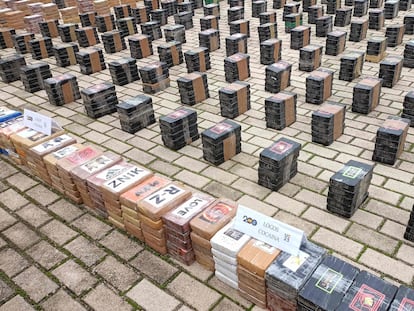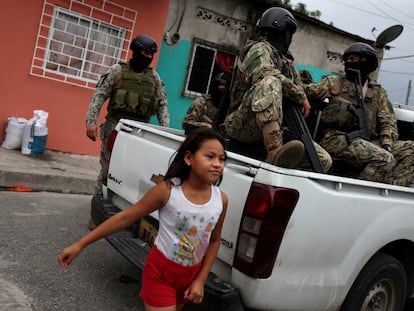Rafael Correa, former president of Ecuador: ‘Everyone knows where the drugs come from. Why isn’t it controlled?’
The former left-wing statesman criticizes incumbent right-wing President Daniel Noboa for failing to address the country’s security crisis and demands an immediate purge of the security forces, which have been infiltrated by organized crime
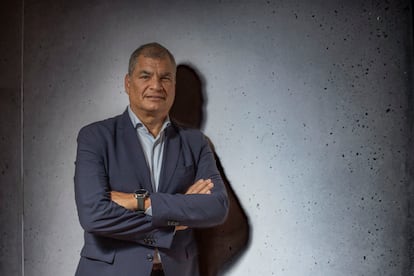

Ecuadorian politics still revolves around Rafael Correa, the former president who governed between 2007 and 2017. Along the way, he completely changed the country and left a successor who — as often happens in politics — broke with him and didn’t continue his legacy. A story as old as life itself.
In the following elections (2021), Correa — through his social-democratic Citizen Revolution Movement — launched a candidate who didn’t succeed. Instead, the country elected a banker named Guillermo Lasso, seeking stability and the economic expertise of a businessman. However, his two-and-a-half years in office proved to be a resounding failure... the prelude to the abyss.
In the last three years, Ecuador has plunged into a spiral of violence that has turned it into one of the most dangerous nations in the world. Everything has happened in the blink of an eye. Three months ago, Correa — who lives in self-imposed exile in Belgium, as he faces a conviction at home that he considers to be political persecution — once again tried to put one of his former ministers in power. This time around, it was a woman named Luisa González: faithful and committed to his cause, he was sure that she wouldn’t betray him. And she came close to victory, but ultimately lost in a runoff election by less than four percentage points. Correa’s former minister was defeated by Daniel Noboa, the son of the richest man in the country. In recent weeks, Noboa has been dealing with an unprecedented security crisis within his country’s borders.
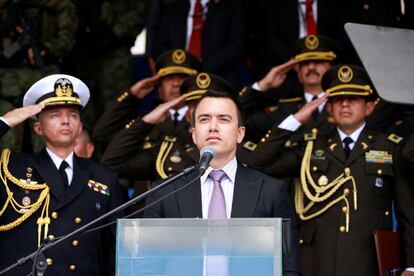
Amidst this period of confusion, people want to know what Correa has to say. His name causes great polarization. There are those who don’t want him to serve as president again under any circumstances (to do so he would have to receive a presidential pardon). And there are those who see him as the politician who achieved a great improvement in the country, thanks to how he spent national earnings during the oil and raw materials boom. In any case, he’s always in the middle of an argument.
The situation in the country is urgent. Ecuador has become the world’s leading exporter of cocaine. Money rains down on the gangs, which are associated with the large Mexican cartels.
“The drug cartels looked south, because they lost the market in the United States and wanted to bring more cocaine here. With the weakening of the state, they entered [the country without a problem],” Correa notes, during a video call with EL PAÍS. “They allied themselves with Los Choneros and Los Lobos. They grew, they became stronger, they armed themselves with bazookas… and something happened that had never happened before: they infiltrated the state. They threaten prosecutors, they infiltrate the Armed Forces, the police above all… [they even infiltrated] Guillermo Lasso’s government (2021-2023). We’ve had seven years of systematic destruction (since he left the presidency). We went from 700 murders a year to 7,800,” he laments.
Correa — a passionate and self-confident man, with a Quixotic touch — shows graphs with data across the screen. Lenín Moreno — his successor — blames him for everything that has happened. Moreno believes that Correa laid the foundation for the destruction that followed his time in office. However, when Correa left the presidency, public safety levels were radically different from where things stand today. He, in turn, believes it was Moreno who disrupted the structure of the state to try to erase his legacy.
“They dismantled everything we built. We had six sectors of the executive branch: one was security, which coordinated all the entities involved, such as the police, intelligence. [Moreno’s administration] eliminated the Ministry of Justice. In 2018, to harm us, they carried out a coup d’état (in a metaphorical sense), in which three of the five state bodies were taken over. They destroyed all the institutions, just to persecute us,” Correa affirms.
Returning to the current situation, Correa believes that this period requires “big solutions, while always respecting human rights.” He believes that there must be a “total” purge of the Armed Forces of Ecuador, which have been infiltrated by drug traffickers. Especially in the Navy. “Everyone knows where the drugs come from: through Putumayo, through the river. Why isn’t it controlled? [You can see all the drugs come out] along the Guayas River, in banana boxes. Unfortunately, there’s complicity on the part of the state. There must be a big purge, you have to risk your life, it needs to be done,” he adds.
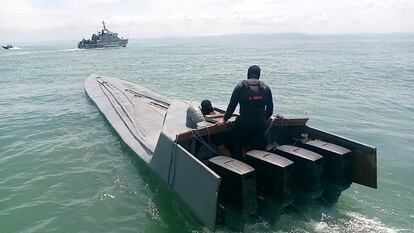
When he came to power, 18 homicides per 100,000 inhabitants were committed in Ecuador on an annual basis. His administration lowered this figure to 5.8. Now, more than 40 murders take place among every 100,000 residents — a national record. Correa maintains that it’s urgent to regain control of the prisons, where gangs exercise absolute power.
The security forces (in theory) regained control of the prisons two weeks ago. However, security experts believe that, soon enough, everything will return to normal — that is, to the control of the criminals inside. From inside the jails, prisoners spend 24 hours a day making calls to extort citizens. “Well, we have to use inhibitors, [we must] isolate them, so that they don’t direct the drug trade from there,” Correa proposes. In his opinion, it’s also not effective for 5,000 police officers to dedicate themselves to bureaucratic tasks instead of being on the street.
Organized crime, the former president continues, is fought with intelligence — something that he alleges “was destroyed” after his departure. He sees El Salvador as an example that gangs can be controlled, although he warns that Nayib Bukele — the Central American country’s president — “has crossed some red lines.”
Noboa — who knows that Bukele’s model attracts many voters who are fed up with insecurity — has announced the construction of two maximum-security prisons to be completed in the next six months. This policy is extremely similar to what’s been carried out in El Salvador. “We must recover the institutionality of the state and surround ourselves with a team of capable people,” Correa emphasizes. “That’s the president’s task, although Noboa’s team is of a very low level.”
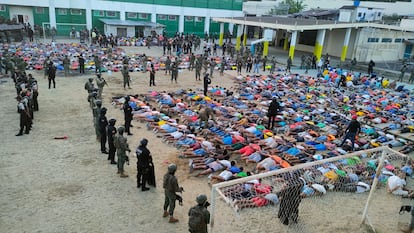
In 2009, Correa dismantled an American military base in Manta, which was supposedly dedicated to intelligence and surveillance tasks. Many have criticized him for this, just as he has been criticized for multiplying the incarcerated population by four during his tenure, by modifying the civil code. Many prisoners ended up having to become gang members to survive behind bars. Correa also negotiated with the most important gangs in 2009, legalizing certain groups and supporting gang members as they reintegrated into civilian life.
It seems absurd to the former president that, in 2024 — 15 years later — there’s grumbling about how he closed a foreign military base. He doesn’t believe what he did has any relationship with the current crisis, just as he doesn’t agree that increasing the prison population had a negative effect. In his view, it was a way of cleaning up the streets. Lastly, he defends the strategy he employed to pacify the gangs. He believes it was a success, because most of the organizations that existed during his tenure have disappeared, except for the Latin Kings.
Correa is convinced that another negotiation with the gangs can be carried out, so long as “the crimes and murders aren’t left unpunished.” A demobilization could occur that would benefit the country.
During his decade in power, Correa was a very personalistic president. Many criticized him for having an authoritarian nature. We ask him if he observes a lack of leadership in the country today.
“Yes, there’s a deficiency,” he opines. “If Evo Morales is re-elected, he’s a dictator. If Merkel wins four times, it turns out that she’s a leader. In [our] countries, there’s a need for leadership that inspires and organizes [the population]. But if you know how to lead and make decisions, you’re an authoritarian. An institutionalized country like the United States functions on its own — such leadership is required here.”
Sign up for our weekly newsletter to get more English-language news coverage from EL PAÍS USA Edition
